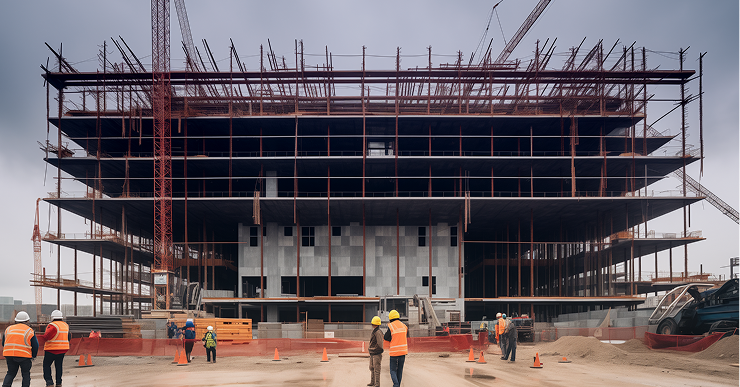3 tips for minimizing risk in New York construction labor Laws
New York. The city that never sleeps, and a state that boasts a vibrant, yet intensely regulated, construction industry. If you’re running a construction company here, you know firsthand that navigating the maze of compliance regulations can feel like trying to find a parking spot in Manhattan during rush hour. Similar to California, New York State construction labor laws are complex, demanding, and the stakes are high.
Staying compliant in the workplace goes beyond simply avoiding penalties. It’s about fostering a fair and productive work environment. This means staying up-to-date on evolving labor and employment laws, ensuring payroll compliance, maintaining proper documentation, and managing mobile workforces.
Challenges that keep New York construction leaders up at night
- Prevailing Wage New York: New York’s prevailing wage laws are designed to ensure fair compensation on public works projects. However, deciphering the correct rates for different trades and localities can be incredibly complex and time-consuming. The Bureau of Public Work and Prevailing Wage Enforcement investigates underpayment complaints, and miscalculations can lead to significant fines and legal battles.
- Wage and Hour Laws: This includes adhering to minimum wage, overtime pay (time and a half for over 40 hours in a week), and proper paystub requirements, especially on public work contracts where prevailing wage rates must be indicated.
- Workers’ Compensation: Maintaining adequate insurance coverage across the board, including Workers’ Compensation, is a paramount risk management concern for employers.
- The Union Landscape: New York’s strong union presence in the construction industry requires strict adherence to reporting obligations, which can vary by union and project. Failing to comply with these reporting requirements can lead to grievances filed by unions, potentially causing costly project delays and disruptions.
- Paid Sick Leave and Benefits Tracking: Construction companies need reliable systems to track employee hours and ensure compliance with paid sick leave and other benefits, especially with a fluctuating workforce.
- Certified Payroll New York: For contractors working on publicly funded projects, certified payroll reporting is non-negotiable. New York has specific requirements for the data that needs to be tracked and reported, often on a weekly basis. Errors or omissions can result in withheld payments and compliance issues.
- Overtime laws: While federal overtime laws provide a baseline, New York has its own rules regarding overtime pay, including daily overtime in certain circumstances. Construction companies need to accurately track all hours worked across different projects and ensure compliance with both federal and state regulations.
- Benefit Administration Headaches: Managing benefits for a construction workforce, which can be fluid and project-based, presents unique challenges. Ensuring eligibility, tracking contributions, and complying with regulations like the Affordable Care Act (ACA) can be an administrative burden.
- Maintaining Accurate and Up-to-Date Records: This includes records for various aspects of compliance, such as safety training, payroll history, and certifications. Poor record-keeping practices can result in missed compliance deadlines, disputes, and even higher insurance claims, negatively impacting Builders Risk Insurance premiums.
- Construction Time Tracking Compliance: Managing a mobile workforce can be a compliance concern, as tracking locations and work hours can be challenging. Additionally, enforcing labor laws, like mandated breaks, is difficult to monitor across multiple sites.
The complexities of New York construction labor laws demand a proactive approach to risk management. Waiting for a compliance issue to arise can be costly and disruptive.
3 steps to confidently manage New York’s complex regulatory environment
- Conduct Regular Internal Audits: Implement a schedule of internal audits to review your timekeeping practices, payroll calculations, and adherence to union contracts. This proactive approach allows you to identify and correct any discrepancies before they escalate into significant problems.
- Standardize Processes and Automate: Document procedures for all workforce management aspects, from timekeeping and payroll to benefits administration and certified payroll reporting, to ensure consistency and reduce errors. Consider implementing an automated process for payroll to eliminate repetitive manual tasks and focus on strategic decision-making for business growth.Leverage digital time tracking to empower workers to track their own hours accurately and efficiently.
- Leverage Technology: Embrace technology solutions specifically designed for the complexities of New York construction labor laws. An all-in-one platform like Fingercheck, which integrates payroll, HR, and time tracking, can automate intricate calculations (including prevailing wages and overtime), accurately track labor costs across different projects and locations, and streamline certified payroll reporting. By centralizing these critical functions, you significantly reduce the risk of human error, data silos, and the administrative burden associated with managing compliance across disparate systems.
By taking these proactive steps, compliance for NY construction companies can be built on a strong foundation, minimizing risk exposure, and propelling focus to the successful execution of projects. In the intricate regulatory environment of New York, a well-informed and prepared approach is your most valuable asset.
Interested in learning more about how Fingercheck can help your construction company manage your risk? Check out our construction solutions.


